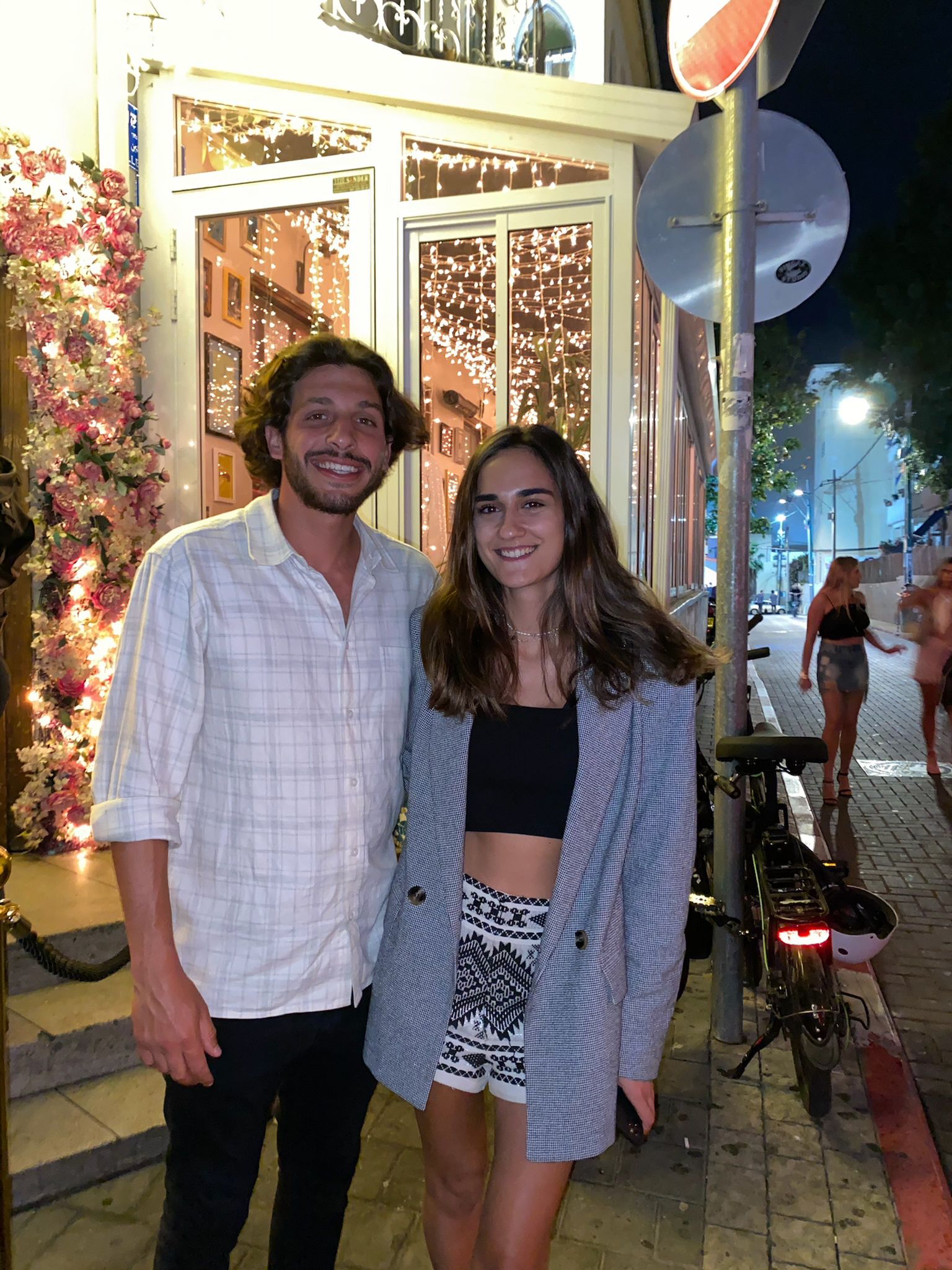On the evening of 6 October, 2023, the Manzuri family gathered at home in Hod Hasharon, Israel, for a Shabbat and Simchat Torah dinner. Norelle, 25, and Roya, 22, were radiant – laughing and excited for the Nova music festival they would attend the next day with friends. They toasted to love, to the future, to a summer wedding on Norelle’s 26th birthday.
By morning, three of the six people at that table would be gone.
“I live every minute with that dinner in my heart,” Sigal tells Jewish News. “It was the last time I saw my daughters alive.”
Norelle and Roya, dual Israel-American citizens, were among the more than 360 people murdered by Hamas terrorists at the Supernova festival in Re’im on 7 October. Also killed was Norelle’s boyfriend, Amit Cohen, who planned to propose. For days after the massacre, Sigal and her family clung to the hope that the three had been kidnapped.
Norelle and Roya Manzuri with Amit Cohen at a music festival. All three were killed on October 7. (Courtesy)
“That was the only scenario where they might still be alive,” she says. “That’s how unimaginable the alternative felt.”
Now, Sigal lives to preserve their memory. Her project, Nora’s Vision, is a tribute to the future her daughters didn’t get to live – a sanctuary where girls in crisis will be supported through fashion, art, therapy and care. “I couldn’t protect them,” she says. “But I can carry their dreams.”
“They chose me as their mother.
Norelle was born in Los Angeles in 1998. “She opened my heart to motherhood,” Sigal says. “She was my best friend.” From a young age, she showed a gift for styling, emotional intelligence, and ambition. “She wanted to combine fashion and psychology to help women in crisis. That was her vision.”
Roya, three years younger, was a gentle spirit – creative, playful, and full of artistic flair. She painted, wrote poetry, and dreamed of studying jewellery design and film in New York. “She touched everyone with light,” Sigal says.

Norelle and Roya Manzuri as children (Courtesy)
The sisters had a bond that was more than siblinghood. “They were each other’s anchors,” their mother says. After army service, Roya joined Norelle and Amit on a trip to Panama. “They travelled together, celebrated life, and grew even closer.
Back in Israel, they rented a flat and began planning a wedding. “They were ready to build a life together,” Sigal says. “We were all so hopeful.”
“We told them to drive safe. We were waiting for them.
On 7 October at 6:29am, Sigal and her husband Manny woke to sirens. “We called the girls right away. They were lying on the ground, trying to protect their heads from rockets,” Sigal recalls.
Soon after, they were told to evacuate the festival. Norelle, Roya, Amit and two friends got into a car and texted the family: they were safe, on the way home. “We told them to drive carefully,” Sigal says. “We were waiting for them.”

Amit Cohen and Norelle Manzuri pictured together. (Courtesy)
But police redirected traffic away from the north. Forced to turn back, the group took shelter in a roadside bomb shelter near Kibbutz Be’eri. Dozens of others had gathered there too.
What followed was a massacre. Gunmen arrived, lobbed grenades, and opened fire inside the shelter. Twelve people survived. Norelle, Roya, and Amit did not.
Sigal and Manny spent the next days in limbo – searching hospitals, calling news outlets, clinging to hope. Roya’s death was confirmed first. Then, during a Zoom call with President Biden and other hostage families, Sigal received a knock at the door. It was confirmation that Norelle, too, had been killed. “I screamed,” Sigal recalls. “It was unbearable.”
“We were six. Now we are three.
In just one week, Sigal buried her daughters and future son-in-law. “It felt like molten lava inside me,” she says. “Like something had burnt out of my chest.”
She and Manny quit their jobs. Shai, 16, left school. “Our Shabbat table had six seats. Now it’s three.”

Roya and Norelle Manzuri as young girls with their father, Manny. (Courtesy)
But through the grief, a mission began to form. Nora’s Vision – a creative therapeutic centre for girls and young women in need – would become their purpose. “It’s what my daughters would have done,” she said. “They wanted to help others through creativity and care. I’m building that for them.”
Already, the family has begun styling sessions for girls in shelters, using Norelle and Roya’s clothing – not as donations, but as tools for storytelling and empowerment. “It helps these girls feel seen,” Sigal says. “And it lets people learn who my daughters really were.”
Next week, Sigal will travel to London to take part in Eternal Embrace, a photography exhibition by Israeli artist Ifat Peer as part of the MomToo project. The exhibition features bereaved mothers and their stories – words and images that honour their lost children and share their last embrace.
“It’s more than an exhibition,” Sigal says. “It’s a cry of pain – and a call to action.”

Clothes and shoes belonging to Norelle and Roya Manzuri, now used in styling sessions for vulnerable girls as part of Nora’s Vision. (Courtesy)
When asked what her daughters would think of Nora’s Vision, Sigal’s voice softens. “They would be proud,” she says. “That gives me strength to keep going.”
She hopes the centre will be a safe haven – a space filled with colour, creativity and hope. “A home for girls who need one. Just as my daughters dreamed.”
And then she adds: “If there’s anything I’m proud of in this world, it’s my children. Nothing else in life was ever as meaningful. And now, continuing their legacy is what gives me the will to live.”